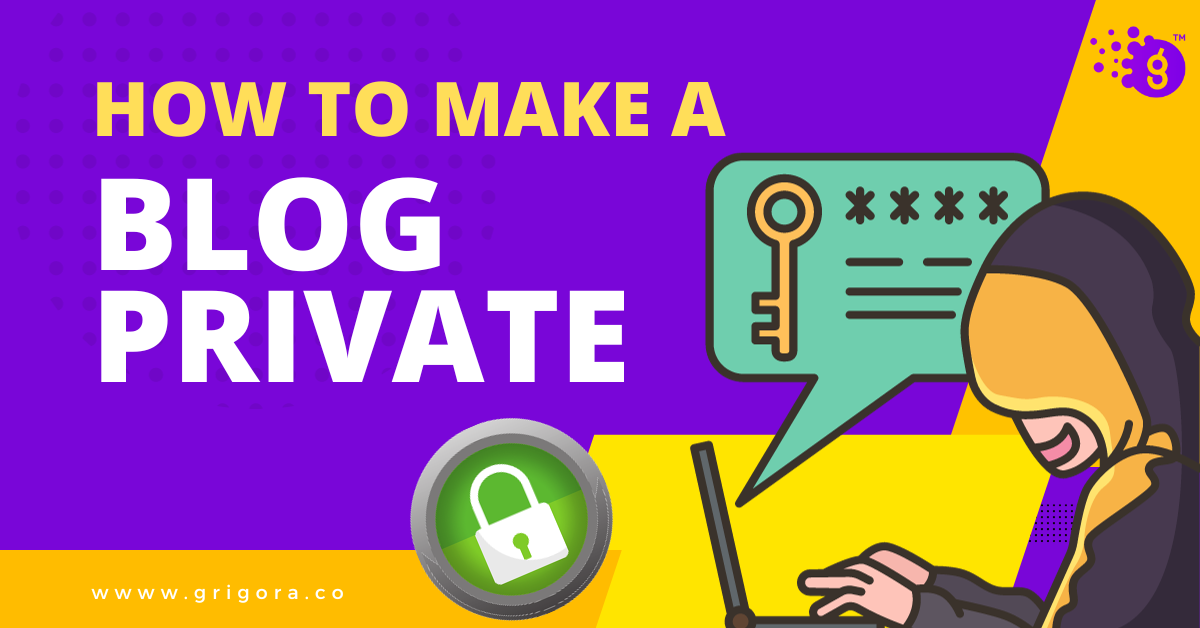Introduction: Embracing Privacy in Blogging
In today's digital age, where oversharing has become the norm, the concept of private blogging emerges as a refreshing counter-narrative. Private blogging represents a conscious choice to create a more controlled, intimate space for sharing thoughts, experiences, and knowledge. This trend is not just about limiting access; it's about cultivating a space where content can be shared with a select audience, offering a sense of exclusivity and personal connection that public blogs often lack.
The growing trend of private blogging signifies a shift in how people choose to express themselves online. It reflects a desire for more meaningful interactions and a controlled sharing environment. In this context, Grigora stands out as a versatile solution, offering bloggers the opportunity to craft a personal, private space while still benefiting from
Understanding Blog Privacy
Blog privacy is a concept that revolves around controlling who can access your blog's content. A private blog is essentially an online diary or journal that is not open to the public but is accessible to a select group of readers, often by invitation or through specific access permissions. This approach to blogging is particularly appealing to those who wish to share their thoughts, experiences, or expertise in a more controlled and intimate setting.
The benefits of choosing a private blog are manifold. It allows for deeper, more meaningful interactions with a dedicated audience, free from the noise and distractions of the wider internet. This can foster a sense of community and trust that is harder to achieve with a public blog. Additionally, private blogging offers a layer of security and confidentiality, which is crucial for topics that are sensitive or personal in nature.
However, there are also considerations to keep in mind. A private blog may have a limited reach, which can be a drawback for those looking to grow a large audience or influence a broader community. It also requires careful management of access permissions, which can be more time-consuming than managing a public blog.
Grigora supports both private and public blogging needs with its versatile platform. It offers robust privacy settings that allow bloggers to easily manage who can view their content. This flexibility makes Grigora an excellent choice for those who value privacy
Deciding to Go Private: Weighing Your Options

When considering the transition to a private blog, it's important to weigh the advantages and potential challenges. Private blogging offers a unique space for personal expression or targeted communication within a controlled environment. This can be particularly appealing for those discussing sensitive topics, sharing personal experiences, or creating content for a specific group of people, like family, friends, or a special interest community.
Advantages of Private Blogging
Controlled Audience: You have complete control over who can access your content. This is especially beneficial for sharing personal or sensitive information.
Enhanced Privacy: A private blog provides a secure platform to express thoughts without the concern of public scrutiny or unwanted attention.
Focused Engagement: With a smaller, more dedicated audience, interactions tend to be more meaningful and engaging.
Potential Challenges
Limited Exposure: By its nature, a private blog reaches a smaller audience, which might not be ideal for those looking to build a large following.
Audience Management: You'll need to manage access permissions, which can be more complex than running a public blog.
Reduced Discoverability: Private blogs are typically not indexed by search engines, meaning new readers are less likely to find your blog organically.
Choosing the Right Platform: Why Grigora Stands Out
Prioritizing Privacy in Platform Selection
In the world of private blogging, choosing the right platform is crucial. This decision goes beyond just finding a place to write; it's about ensuring a secure and private space for your personal thoughts. Grigora stands out in this regard, offering robust privacy settings tailored to the needs of private bloggers.
User Control and Customization on Grigora
Grigora's strength lies in its user control and customization. Unlike other platforms with rigid privacy settings, Grigora offers a range of options, allowing bloggers to tailor their privacy settings. This flexibility is key in a private blogging environment, where each blogger's privacy needs can vary significantly.
Ease of Use: A Core Feature of Grigora
Navigating privacy settings can often be daunting, especially for new bloggers. Grigora's user-friendly interface simplifies this process, making it accessible for bloggers at all levels. This ease of use ensures that bloggers can focus more on content creation and less on managing technical aspects.
Community Engagement Within Private Spaces
A unique challenge in private blogging is maintaining audience engagement within the privacy constraints. Grigora addresses this by offering community engagement tools, such as commenting and feedback features, even within private blogs. This fosters a sense of community and interaction, which is often lacking in private blogs on other platforms.
Grigora: A Balanced Approach to Private Blogging
Grigora's approach to private blogging is well-rounded, balancing privacy, ease of use, and audience engagement. This makes it an ideal platform for those who seek a secure space for their private thoughts, without sacrificing user experience and community interaction.
Managing Your Private Blog Audience
Effectively managing your private blog audience is a key aspect of maintaining the privacy and intimacy of your blog. Here are some strategies to control who has access to your content:
Inviting Readers
You can invite specific individuals to view your blog, such as friends, family, or a select group of people who share your interests. Invitations can typically be sent via email, ensuring that only those you trust have access to your private content.
Approving or Denying Access
As requests to access your blog come in, you have the power to approve or deny these requests. This level of control ensures that your audience remains exclusive and aligned with your privacy goals.
Communicating with Your Audience
Most blogging platforms provide tools for you to communicate with your audience. Whether it's through comments, direct messages, or blog updates, these features help you keep your readers engaged and informed about your blog's content.
Building a Trusted Community
By carefully selecting your audience, you can build a trusted community around your blog. This community becomes a safe space for sharing and discussion, enhancing the value of your private blog.
Feedback and Interaction
Encourage feedback and interaction from your audience. Commenting features allow for a two-way conversation, making your blog more dynamic and engaging.
Content Strategy for Private Blogs
Developing a content strategy for a private blog involves a different approach compared to public blogs. Since your audience is more defined and possibly more engaged, your content can be more personalized and in-depth.
Tailoring Content for a Private Audience
Personalization: Your content can be more personalized, addressing the specific interests and needs of your audience. This could include detailed discussions, personal stories, or niche topics that might not appeal to a broader public audience.
Depth of Topics: With a private blog, you have the freedom to delve deeper into topics without worrying about appealing to the masses. This can lead to more meaningful and in-depth content.
Exclusive Content
Unique Offerings: Consider offering content that is exclusive to your private blog, such as in-depth guides, personal anecdotes, or specialized knowledge that you wouldn’t share on a public platform.
Member-Only Benefits: You can create content that offers added value to your members, like exclusive access to webinars, downloadable resources, or one-on-one consultations.
Engaging Content Formats
Interactive Elements: Incorporate interactive elements like polls, Q&A sessions, or discussion threads to engage your audience.
Multimedia Integration: Use various multimedia elements like videos, podcasts, or infographics to make your content more engaging and varied.
Consistency and Quality
Regular Updates: Maintain a consistent posting schedule to keep your audience engaged and looking forward to your content.
High-Quality Posts: Ensure that each post maintains a high standard of quality, as your audience is there for the value you provide.
Building a Community Within Your Private Blog
Creating a sense of community is especially important in a private blog, where engagement and interaction can significantly enhance the value of your content.
Fostering Engagement and Interaction
Encourage Discussions: Create posts that invite comments and discussions. Ask questions, seek opinions, and actively participate in the conversations that ensue.
Feedback and Suggestions: Regularly ask for feedback and suggestions from your readers. This not only improves your blog but also makes your readers feel valued and heard.
Creating a Safe and Inclusive Space
Moderation Policies: Establish clear moderation policies to ensure respectful and constructive interactions.
Inclusivity: Make sure your blog is a welcoming space for all readers, regardless of their background or viewpoints.
Exclusive Events and Features
Member-Only Events: Organize online events such as webinars, live Q&As, or virtual meetups that are exclusive to your blog members.
Special Features: Offer features like member spotlights, guest posts from members, or collaborative projects to foster a sense of belonging and community.
Utilizing Social Media and Forums
Private Groups: Consider creating private groups on social media platforms or forums where your readers can interact with each other and with you in a more informal setting.
Regular Updates: Keep your community informed about upcoming posts, events, and any changes to the blog.
Technical Insights: Securing Your Private Blog
Ensuring the security and privacy of your blog is crucial, especially when handling sensitive or personal information shared within a private community.
Prioritizing Data Security
Secure Hosting: Choose a hosting provider known for its strong security measures. Look for features like SSL certificates, regular backups, and robust firewalls.
Regular Updates: Keep your blogging platform and any plugins up to date. Regular updates often include security patches that protect against vulnerabilities.
Protecting User Privacy
Privacy Policies: Clearly communicate your privacy policies to your readers. Be transparent about how you collect, use, and store their data.
Data Encryption: Implement data encryption methods to protect sensitive information transmitted through your blog.
Controlling Access
Strong Authentication: Use strong authentication methods for login, such as two-factor authentication, to prevent unauthorized access.
Selective Sharing: Be cautious about who you grant access to your blog. Regularly review and manage your list of authorized readers.
Handling Sensitive Content
Content Moderation: Monitor and moderate the content shared on your blog to ensure it adheres to privacy standards and does not infringe on anyone's rights.
Legal Compliance: Stay informed about laws and regulations related to online privacy and ensure your blog complies with these standards.
SEO Considerations for Private Blogs
Navigating the SEO landscape for a private blog presents unique challenges, as the primary focus is on a restricted audience rather than public searchability.
Understanding SEO for Private Blogs
Limited Indexing: Since private blogs are not fully indexed by search engines, traditional SEO strategies might not apply.
Focus on User Experience: Prioritize the user experience for your existing audience. This includes fast loading times, mobile responsiveness, and easy navigation.
Internal SEO Strategies
Keyword Usage: Even in a private setting, using relevant keywords can help organize content and enhance the user experience.
Content Structuring: Use clear headings, subheadings, and a logical structure to make your content easily navigable for readers.
Leveraging Social Shares
Encourage Sharing: While your blog is private, encourage your readers to share your content within their trusted networks.
Social Media Integration: Integrate social media sharing options to facilitate easy sharing of your content.
Analytics and Feedback
Use Analytics Tools: Implement analytics tools to track reader engagement and preferences within your private blog.
Gather Feedback: Regularly seek feedback from your readers to understand what content resonates with them and optimize accordingly.
Legal Aspects of Running a Private Blog
Understanding and adhering to legal considerations is crucial for private bloggers to ensure they operate within the bounds of the law and respect their readers' privacy.
Privacy Laws and Regulations
Data Protection: Be aware of data protection laws like GDPR if your blog has readers from the European Union. This involves handling personal data responsibly.
User Consent: Obtain consent from your readers for any data collection, and provide clear privacy policies.
Intellectual Property Rights
Respecting Copyright: Ensure that all content, including images and text, is either original, licensed, or used under fair use provisions.
Protecting Your Content: Consider copyrighting your original content to protect it from unauthorized use.
Disclaimer and Transparency
Use of Disclaimers: If you share advice or opinions, include a disclaimer stating that your content is for informational purposes only.
Transparency with Sponsored Content: If you engage in sponsored posts or affiliate marketing, be transparent about these relationships.
Handling Sensitive Topics
Sensitive Content: Be cautious when discussing sensitive topics. Avoid sharing information that could be harmful or offensive.
Age Restrictions: Implement age restrictions if your content is not suitable for all audiences.
Monetizing Your Private Blog
Monetizing a private blog can be a unique challenge, but with the right strategies, it can also be a rewarding venture. Here are some ways to generate income from a private blog while maintaining its exclusive nature.
Exclusive Content and Memberships
Membership Tiers: Offer different levels of access or content to readers who subscribe to your blog. This can include exclusive articles, videos, or resources.
Premium Content: Create in-depth, high-quality content that is available for purchase or through a subscription model.
Sponsored Content and Partnerships
Selective Sponsorships: Partner with brands or services that align with your blog's theme and values. Ensure that sponsored content is relevant and valuable to your audience.
Affiliate Marketing: Use affiliate links within your content, but choose products or services that genuinely benefit your readers.
Digital Products and Services
E-books and Guides: Write and sell e-books or guides related to your blog's niche.
Online Courses or Webinars: Develop and offer online courses, workshops, or webinars for your audience.
Donations and Support
Patreon or Crowdfunding: Use platforms like Patreon to receive support from your readers. Offer exclusive perks or content in return for their patronage.
One-Time Donations: Allow readers to make one-time donations to support your blog.
Ethical Considerations
Transparency: Be transparent about any monetization methods you use. Clearly disclose sponsored content and affiliate links.
Value to Readers: Ensure that any monetized aspect of your blog adds value to your readers and enhances their experience.
Transitioning to a Private Blog
Transitioning from a public to a private blog is a significant decision that involves careful planning and clear communication with your audience. Here's how to make this transition smoothly:
Assessing Your Reasons
Purpose of Privacy: Understand why you want to make your blog private. Whether it's for creating a more focused community or sharing sensitive content, your reasons will guide your transition strategy.
Audience Impact: Consider how this change will affect your current readers. Will it align with their interests and expectations?
Planning the Transition
Timeline: Set a clear timeline for the transition. This helps in preparing your audience and organizing the necessary changes to your blog.
Technical Adjustments: Plan the technical aspects of making your blog private, such as adjusting settings, managing access, and ensuring data security.
Communicating with Your Audience
Announcement: Inform your readers about the upcoming change. Use your blog, email newsletters, and social media to reach your audience.
Reasons and Benefits: Explain why you are making the blog private and how it will benefit your readers. This transparency helps in retaining their trust and interest.
Managing Subscriptions and Access
Invitations: Decide how you will manage access to your private blog. Will you invite current subscribers, or will access be request-based?
Subscription Options: Offer clear subscription options for your readers. This might include free access, paid memberships, or a combination of both.
Post-Transition Engagement
Feedback: After the transition, seek feedback from your audience. This helps in understanding their experience and making necessary adjustments.
Continued Engagement: Keep engaging with your readers through regular updates, exclusive content, and interactive features.
Success Stories: Private Blogs
Private blogs can be incredibly successful, offering unique content and fostering close-knit communities. Here are some insights from successful private blogs:
Niche Expertise
Focused Content: Many successful private blogs are centered around niche topics. This specificity attracts a dedicated audience seeking expert knowledge or unique perspectives.
Expert Contributions: Some private blogs feature guest posts from industry experts, adding credibility and variety to their content.
Community Building
Engaged Readership: Successful private blogs often have highly engaged communities. These blogs create a sense of exclusivity and belonging among readers.
Interactive Features: Utilizing interactive features like forums, Q&A sessions, and webinars helps in building a stronger community.
Personalized Experience
Tailored Content: Private blogs can offer personalized content based on reader preferences and feedback, enhancing the user experience.
Exclusive Access: Offering exclusive access to certain content, events, or resources can be a key factor in the success of a private blog.
Monetization Strategies
Membership Models: Many private blogs successfully implement membership models, where readers pay for access to premium content.
Specialized Products or Services: Some blogs offer specialized products or services, such as e-books, courses, or consulting, as part of their monetization strategy.
Overcoming Challenges
Content Originality: Maintaining originality and high-quality content is crucial for private blogs to keep their audience engaged.
Audience Growth: While growth can be slower for private blogs, focusing on quality over quantity often results in a more loyal readership.
FAQs on Private Blogging
How does one ensure the privacy of a blog?
Ensuring the privacy of a blog involves selecting a blogging platform that offers robust privacy settings. This includes options to control who can view your blog, such as password protection or invitation-only access. Regularly updating privacy settings and being mindful of the information shared in blog posts are also key practices.
Can a blog be switched from public to private?
Yes, most blogging platforms allow you to change your blog's privacy settings. This can usually be done in the blog's settings menu, where you can select options to make the blog private and restrict its visibility to a select audience.
What are the best practices for engaging a private audience?
Engaging a private audience effectively involves creating content that resonates with them personally. Since the audience is more controlled and specific, tailoring your content to their interests and preferences is crucial. Additionally, encouraging interaction through comments or private forums can foster a sense of community.
How can one monetize a private blog?
Monetizing a private blog can be challenging but not impossible. Strategies include offering exclusive content for a subscription fee, creating members-only access to certain areas of the blog, or providing specialized services or products relevant to the blog's niche.
Does SEO matter for private blogs?
SEO can be less critical for private blogs since they are not typically aimed at attracting traffic from search engines. However, basic SEO practices can still be beneficial, especially if part of the blog is public or if you plan to make the blog public in the future.
Conclusion: The Unique Path of Private Blogging
Private blogging offers a distinctive and intimate way to share content with a select audience. It's a journey that combines the personal touch of sharing your thoughts and experiences with the privacy and exclusivity of a controlled environment. This approach to blogging is particularly appealing for those who wish to create a safe space for themselves and their readers, away from the public eye.



